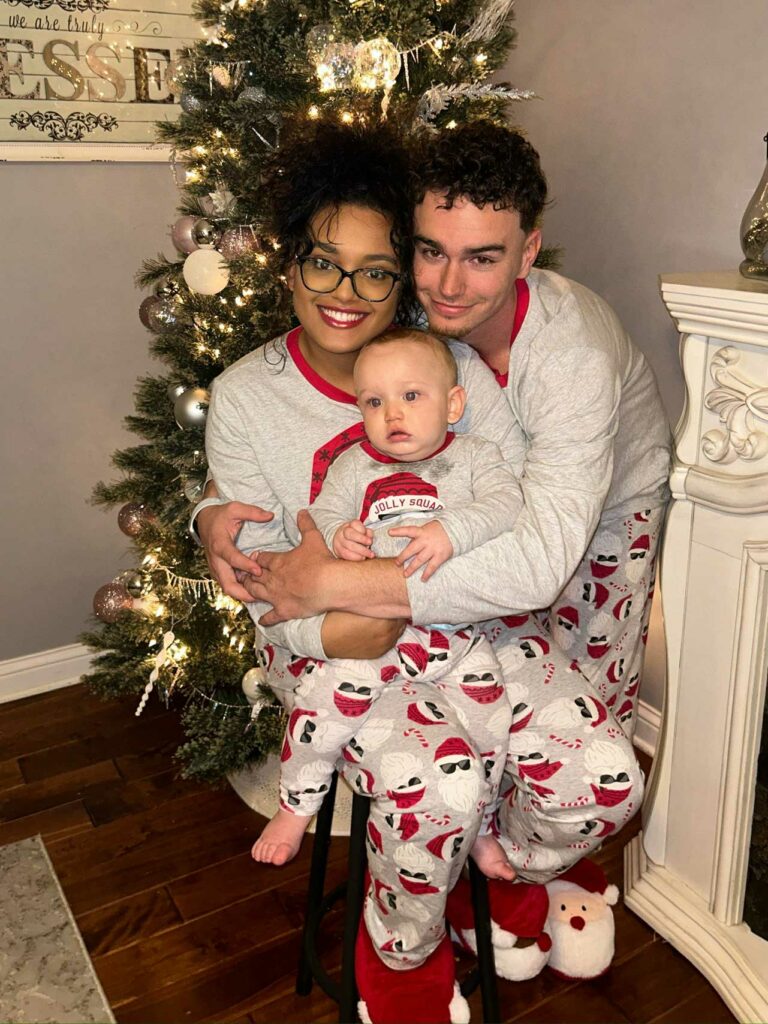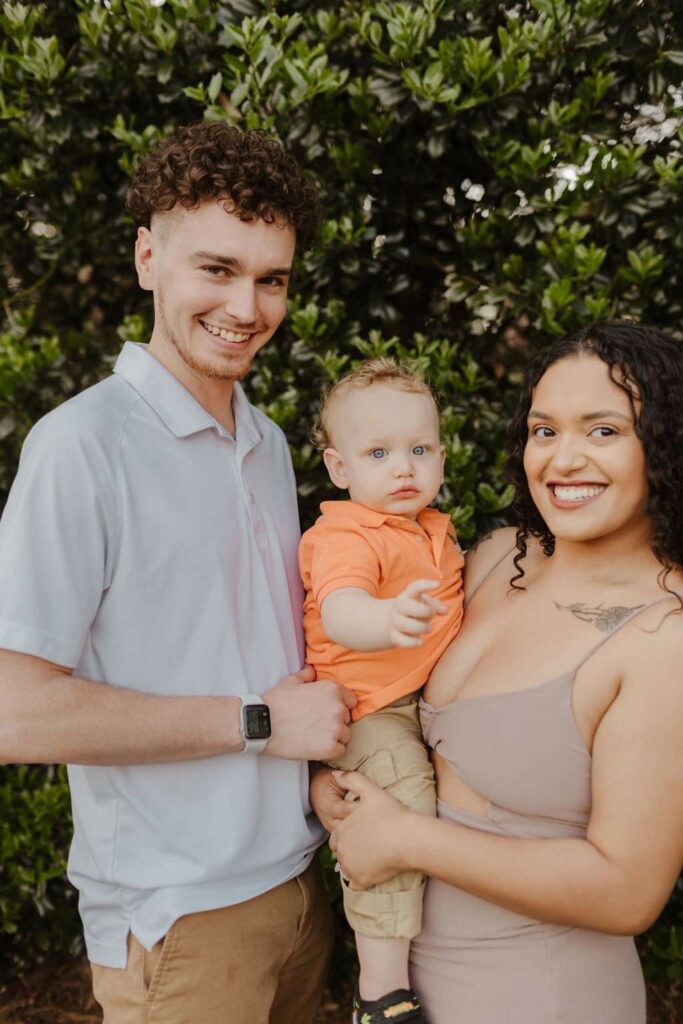HER LIFE WAS AT RISK. ALABAMA DIDN’T CARE.
Tamara Costa needed an immediate abortion. All she got was a sticky note with the phone number of a clinic 580 miles away. Here’s how one state’s severe laws punish families in terrifying health situations
BY JULIANNE ESCOBEDO SHEPHERD
Tamara Costa was over the moon when, in June 2024, she discovered she was pregnant for the second time. A 24-year-old logistics analyst in Athens, Alabama, she and her now-husband Caleb were already raising a toddler son, Xavier, and were eager to give him a sibling. They began saving for a larger house to accommodate a growing family. Tamara had gotten a pregnancy test at a Publix, sneaking away from her mom to buy it so she could surprise her. “As soon as it was positive, we ran to [Xavier’s] Grandma, like ‘Look!’” she says. “Everyone was all excited.”
But the day after she took the test, Costa began bleeding enough that she went to the hospital, where she says she was told that, four weeks into her pregnancy, she was having a miscarriage. The bleeding had stopped by the time she saw her OB-GYN but, after a routine check-up in mid-July—near the end of her first trimester—genetic testing found that the fetus had a high risk of triploidy, a usually fatal chromosomal abnormality. The OB-GYN then directed her to a maternal-fetal medicine specialist (MFM), trained to diagnose and treat high-risk pregnancies, an hour and a half away in Birmingham.
In early August, the MFM performed a high-resolution ultrasound—and the news was heartbreaking. The fetus didn’t have a skull, the specialist told them; the heart, liver and other organs were outside the body; the lower extremities couldn’t be seen at all. “I was pretty quiet, but my husband was like, ‘Are you sure your results are correct? Are you sure your ultrasound is up to date?’” Costa remembers. “I think we were just trying to hear that there could be a possibility of something different. But the specialist said that Baby would not survive outside of the womb, and there was nothing that we could do. And he said I could get sick, so termination was his only recommendation he was giving—and I had to go to my OB-GYN for more information on that.”
But the OB-GYN did not offer “more information”—at least not in the way they might have hoped. When Costa and her husband arrived at her appointment the following week, they say that the OB-GYN told them that, as they were in Alabama, there weren’t “a lot of resources,” but that she’d see what she could find.
Then she handed her a sticky note with a phone number and the words “Planned Parenthood Chicago” written on it. “She told me that she’d be willing to see me afterwards to do genetic testing, just to confirm that it was nothing with me that happened,” says Costa, “and that was pretty much the last time I heard from my doctor.”
THE LAW IN ALABAMA: AIMED AT “UTTERLY ISOLATING THE PERSON WHO IS PREGNANT”
Alabama is among the 14 states in the U.S. with a total abortion ban, in which the procedure is illegal in virtually all cases, at all stages of pregnancy. Under the law, which passed in 2019 but only took effect after the Supreme Court’s Dobbs decision in 2022, performing an abortion is a Class A felony with a punishment of up to 99 years in prison, plus a $100,000 fine. Today, the state is fighting to put even more strictures on reproductive care; in February 2024, an Alabama Supreme Court ruling granted personhood to embryos, temporarily halting IVF in the state.
At the same time, Alabama Attorney General Steve Marshall has made criminalizing abortion care and gender-affirming care a crusade, and has threatened to use an 1896 conspiracy law to criminalize anyone who helps a pregnant person travel out-of-state to obtain an abortion or even gives a patient information about how to do so. “If someone was promoting themselves out as a funder of abortion out of state,” Marshall told a radio show in 2022, “then that is potentially criminally actionable for us.” He then promised to “fully implement this law.”
Doctors and clinics have taken action to try to protect Alabama patients—including by suing to block AG Marshall from what they see as muzzling health-care providers. Robin Marty, the executive director of the WAWC Healthcare clinic in Tuscaloosa and a plaintiff in the lawsuit, says these laws are aimed at “completely and utterly isolating the person who is pregnant, because if you cut them off from information and any sort of assistance, then you have essentially isolated her and forced her to do what you want. And let’s be honest, that’s what domestic abusers do: isolate and then abuse and force them into what you want.”
 Tamara and Caleb Costa at their wedding. (Photo courtesy of Tamara Costa)
Tamara and Caleb Costa at their wedding. (Photo courtesy of Tamara Costa)
There are resources for pregnant people in dangerous health circumstances—notably, abortion funds, which offer financial and logistical assistance. But pending the results of the lawsuit, none in the state of Alabama are currently allowed to operate, and Costa wasn’t aware of out-of-state resources that can help. So she and her husband maxed out a credit card to cover the expenses for the last-minute, 580-mile trip to Chicago—flights, rental car, hotel, food, and childcare for Xavier back home.
In the week leading up to Costa’s Chicago appointment, she began feeling even sicker, but her doctors couldn’t see her again before she left—and so, feeling neglected, she decided just to wait. When Costa finally arrived at Planned Parenthood on August 16, the clinic performed a routine pre-procedure ultrasound, and the OB-GYN on duty, Dr. Erica Hinz, went in to see the couple as soon as she’d reviewed it. Costa, she said, was experiencing a partial molar pregnancy, along with her fetus’s triploidy. (The Meteor has reviewed Costa’s medical records from Alabama and Illinois and confirmed these diagnoses and treatment.)
Dr. Hinz remembers that Caleb, in particular, “was really surprised to hear that. No one in her care up until this point had even mentioned the word molar pregnancy to her, right?” recalls the doctor. “I was very, very angry and very, very shocked.”
“IT SHOULD NEVER HAVE GOTTEN THAT FAR”
Molar and partial molar pregnancies are potentially life-threatening diagnoses in which an abnormal placenta grows at an accelerated rate; it can also develop precancerous cysts. The condition is rare, but can cause long-term complications; the placenta can grow into the muscles around the uterus and invade the pregnant person’s other organs, and the associated hyper-metabolism can cause anemia, heart attacks, and multiple-organ failure leading to seizure and stroke. The cysts within a molar pregnancy can also develop into cancer. Dr. Hinz says it’s rare to see a molar or partial molar pregnancy progress as far as Costa’s, because “with ultrasound technology these days, we catch it pretty early, and that’s why it’s become not as dangerous—because you catch it and you treat it early…In her case, it should have never gotten that far.”
 The Costas with their son, Xavier, at Christmas. (Photo courtesy of Tamara Costa)
The Costas with their son, Xavier, at Christmas. (Photo courtesy of Tamara Costa)
Dr. Hinz knew that Costa needed termination immediately, but because Planned Parenthood was not equipped to perform a blood transfusion if she needed one, she urgently arranged for Costa to have the procedure done immediately at a nearby hospital. “Honestly, if she were delayed any further, I think she would have had a much worse outcome,” says Dr. Hinz.
“I was in surgery within, like, an hour of being there,” Costa says of her hospital experience. “At that point, I think we were terrified.”
If any delay was so risky, why was Costa forced to wait two weeks and travel three states away to get the healthcare she so clearly needed? In Alabama, there is one highly restricted exception to the abortion ban: Care is allowed only if there is serious health risk to the pregnant person, and if two Alabama-certified physicians have confirmed the diagnosis. Costa’s partial molar pregnancy could have met the criteria, if she’d had that diagnosis earlier, and it’s possible she could have received care in the state.
But advocates tell The Meteor there is no guarantee that any Alabama facility would have been willing to perform the procedure. The wording of Alabama’s abortion ban is confusing, and according to Robin Marty, has cultivated an environment in which doctors can be terrified to act on their diagnoses. This has “destroyed the doctor-patient relationship,” says Marty. “Patients can’t trust doctors, either because the doctors are withholding information because they don’t want a patient to seek an abortion for ‘moral’ reasons, or they are withholding the information in order to protect themselves from any sort of potential litigation or ending up in jail. But on the other hand…doctors can’t necessarily trust the patients. I know that at our clinic, when we have patients who say, ‘Okay, I want an abortion, where can I get it?’, we can’t trust that these patients are actually trying to seek out this information and not trying to entrap us. So now the doctors can’t trust the patients, the patients can’t trust the doctors, and it has destroyed the confidence in the medical system at all. And so how are we supposed to deal with these extraordinarily life-threatening conditions when nobody can provide the information that needs to happen in order to make a good decision for the patient?”
The Costas’ experience reflected this fear-filled medical environment. Caleb Costa remembers that the doctors in Alabama were speaking in euphemisms. “They used the term ‘because of what’s going on,” he says. “‘In our current’ you know, ‘environment,’ there is not much we can do about it unless the heartbeat stops.”
“THIS ISN’T A DEMOCRAT OR REPUBLICAN THING…IT WAS ABOUT MY HEALTH.”
Tamara and Caleb Costa met at the University of Alabama through mutual friends. They’d both grown up in the same area of Kentucky, and were living quiet lives that revolved around work, family, and University of Alabama football. Tamara never thought she would have an abortion herself, though she didn’t think her beliefs should restrict how another person might feel. But this experience has changed them both, and the trauma is still fresh. “This isn’t a Democrat or Republican thing,” she says. “It was human rights. It was about my health.”
Of the laws that put her in danger, Costa continues: “It seems like they’re concerned with life, right? [But] the only person that was affected was me. They said the baby wasn’t compatible with life. The only life that was affected in this [situation] was the living one. The only one that could survive was me. And it wasn’t a priority…The state, by making the decision for me, was essentially saying Baby’s life was already gone—so we were both gonna die.”
 “Everything I enjoy doing mostly revolves around my family,” says Tamara Costa, here with Caleb and Xavier. (Photo courtesy of Tamara Costa)
“Everything I enjoy doing mostly revolves around my family,” says Tamara Costa, here with Caleb and Xavier. (Photo courtesy of Tamara Costa)
It was “like she didn’t matter,” says Caleb Costa through tears. “Her life was at risk and it didn’t matter to anybody. She didn’t have an option here to get help, and that’s not fair to her… We were told we needed to terminate our child in Alabama, but Alabama said, you can’t do it here. Make it make sense.”
Back in Huntsville, Costa and her family are still dealing with the ripple effects of their ordeal. “Everything I enjoy doing mostly revolves around my family,” she says, including her three new siblings—foster kids whom her parents recently adopted. Tamara, Caleb, and Xavier have moved to another house, but they’re still paying off their credit card debt for their Chicago trip. They’re taking in every Crimson Tide game and watching their fantasy football brackets, but Tamara regularly sees a new local OB-GYN recommended by Dr. Hinz, because they have to monitor her blood on a weekly basis for any residual health risks from the partial molar pregnancy, which can continue to cause dangerously high hormone levels even after it’s treated. And, in fact, her levels of hCG—the hormones produced by pregnancy or cancer cells—still haven’t gone back down to zero.
But the couple is trying to both honor their baby and still move on. “I lost a part of me,” Tamara says. “So we were trying to figure out how we were going to keep that memory.”
“We decided we wanted something that was living and could grow.”
Late this summer, Caleb and Tamara bought a baby plant from a botanical garden in Huntsville. They tucked the ultrasound photograph into it, so that as the plant grows, “Baby is still growing with us.”
“We’ve just been trying,” Tamara says, “to heal the best way that we can.”
Julianne Escobedo Shepherd is a Xicana writer, editor, and co-founder of the music and culture publication Hearing Things. Her first book, Vaquera, about growing up Mexican American in Wyoming and the myth of the American West, is coming soon from Penguin.
Read more about the medical facts of Tamara Costa’s case here. And read more United States of Abortion reporting here.
Video Credits
Director: Amy Elliott
Editor: Dana Cataldo
DP: Brack Bradley
Camera: Jacob Cantrell
Audio: Neil Bagley
Producer: Annie Venezia
![]()
This film is a project of The Meteor Fund, and produced in partnership with Harness; with support from Pop Culture Collaborative.